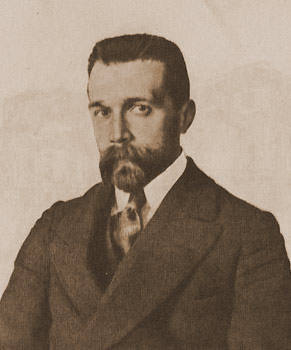Myaskovsky, Cello Sonata No. 1
 Nikolai Myaskovsky (1881-1950) holds a prominent place in Russian music of the early 20th century, although he is somewhat in the shadow of Shostakovich and Prokofiev. He was born in Novogeorgiyevsk (Nowy Dwór Mazowiecki) near Warsaw, a fortress town on what was then Russia’s eastern frontier. His father was a fortification engineer. Myaskovsky grew up in a military environment and was schooled as a naval cadet. He managed however to study piano and violin.
Nikolai Myaskovsky (1881-1950) holds a prominent place in Russian music of the early 20th century, although he is somewhat in the shadow of Shostakovich and Prokofiev. He was born in Novogeorgiyevsk (Nowy Dwór Mazowiecki) near Warsaw, a fortress town on what was then Russia’s eastern frontier. His father was a fortification engineer. Myaskovsky grew up in a military environment and was schooled as a naval cadet. He managed however to study piano and violin.
After moving to St. Petersburg in 1896, he began composing and playing in an amateur orchestra. He began studying privately with the young composer Reinhold Glière in 1902. Glière had two students, Myaskovsky and the 11-year-old Sergie Prokofiev. When he subsequently entered the St. Petersburg Conservatory in 1906 to study with Rimksy-Korsakov, Myaskovsky was the oldest student in his class while Prokofiev was the youngest. He and Prokofiev remained close friends through his life.
Myaskovsky would serve on the Austrian front during World War I and then in the Red Army from 1917-1921. He was appointed professor at the Moscow Conservatory in 1921 and would hold that position for the rest of his life. He taught many of the next generation of composers, including Kabalevsky and Khachaturian.
His two cellos sonatas come at the beginning and end of his career. The first, initially written in 1911 and substantially revised in later years, has been overshadowed by the second, written for Mstislav Rostropovich in 1948. He was known as a champion of modern music (and an early supporter of Stravinsky), and his first cello sonata was somewhat ignored as being too much in the mold of Rachmaninov. But long, lyrical melodic lines and conventional harmonies characterize both works.
Known as “musical conscience of Moscow,” Myaskovsky would, like so many others, eventually run afoul of Stalin. In 1947, he was denounced along with Shostakovich and Prokofiev for writing anti-Soviet music and was “rehabilitated” only after his death.



